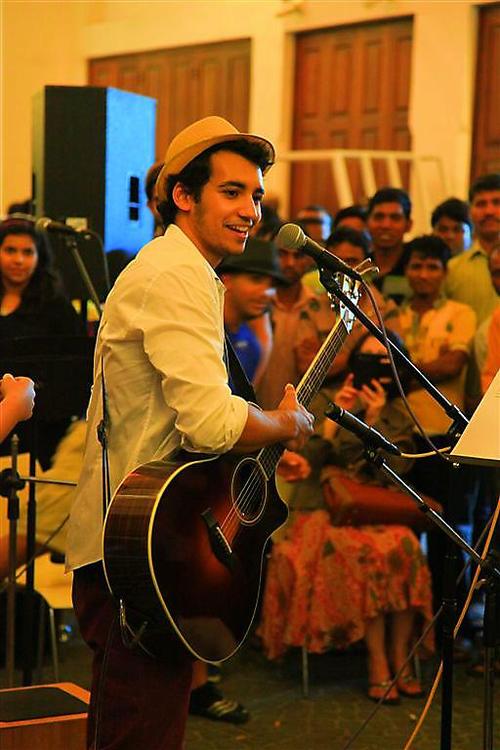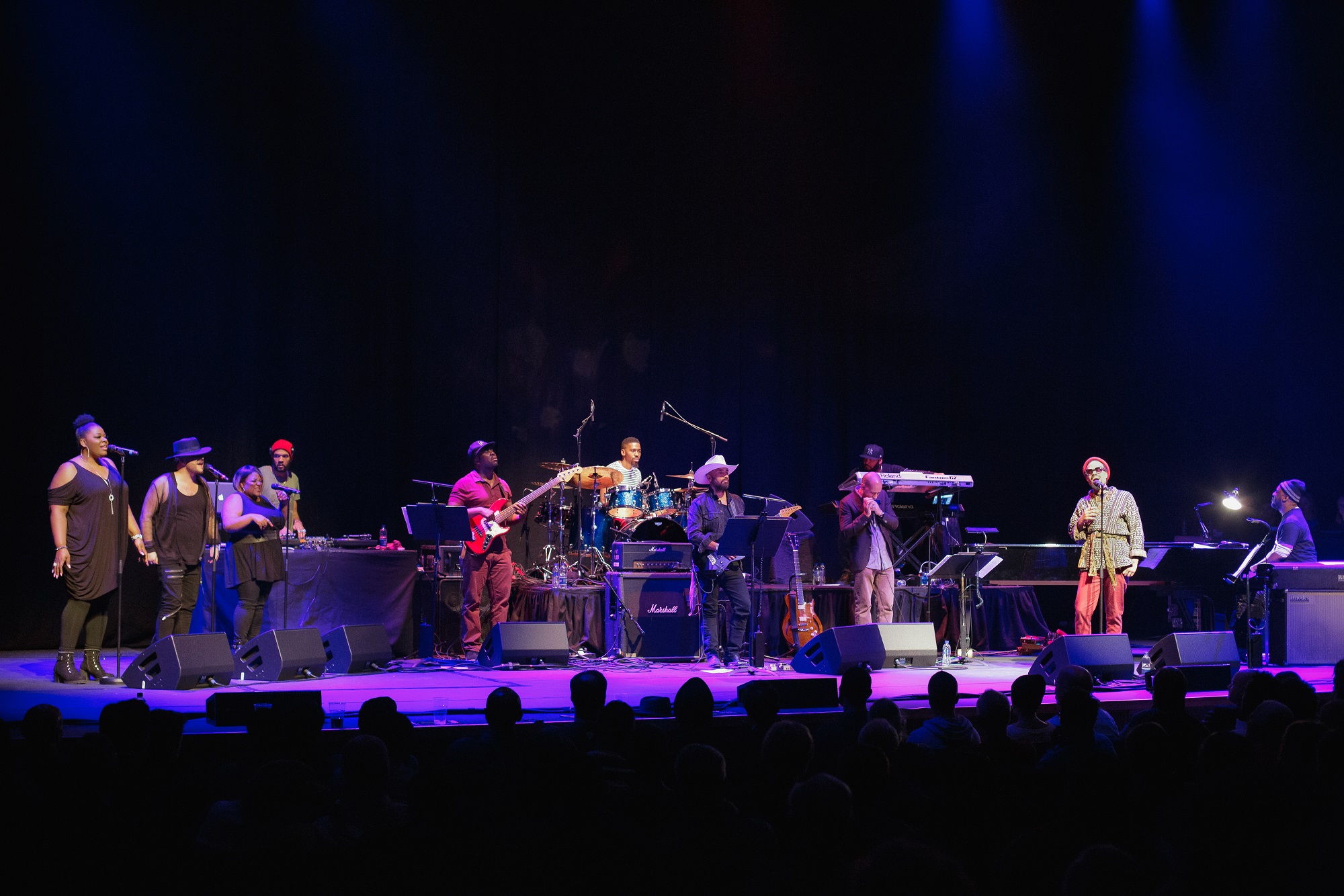A nineteen-minute adaptation of “Jack Orion” took up the whole of Side Two of Cruel Sister, Pentangle’s fourth album. It's the highlight of the smart but blandly titled 115-track box set The Albums 1968–1972. Up to this point in 1970, British folk rock had not spawned anything comparable to the epic “Jack Orion”.

“Back in the Sixties, before I was born…” Robert Plant has always been as amusing a raconteur as he is a deft weaver of different musical styles, and last night’s show at the Royal Albert Hall was no exception.

With December upon us theartsdesk on Vinyl has been kept busy with sacks full of fantastic plastic, so much so that we’re saving the poppier stuff for a pre-Christmas blow-out in a week’s time, so watch out for that.

Nothing beats a great singer-songwriter live and unadorned. So it was with Tom Russell at London’s 100 Club on the penultimate night of his UK tour. Accompanied by his faithful friend the brilliant Milanese Max Bernadino on guitar, the man whom Lawrence Ferlinghetti describes as “Johnny Cash, Jim Harrison and Charles Bukowski rolled into one” gave a brilliant performance which was a masterclass in audience engagement.

Until now, the easiest non-bootleg way to hear the early Rolling Stones live was via the various home cinema editions of October 1964’s T.A.M.I. show. Otherwise, although they employed backing tracks for broadcast, the American DVDs of their Ed Sullivan Show appearances caught the band in thrilling full flight.

In 1976, Polydor Records was actively considering signing the Sex Pistols. The label’s Chris Parry checked them out live in Birmingham during August. In September, he had a prime spot behind the mixing desk at the 100 Club’s punk festival from which to consider British punk rock’s figureheads. However, the band’s manager Malcolm McLaren signed them to EMI.

It really is quite something to be admired, the sheer longevity and staying power of the Jools Holland franchise. The TV show Later...With Jools Holland, with the same core team running it, has just celebrated its 25th anniversary and put its 51st season to bed. That takes us all the way back to October 1992, just after the summer of John Bryan and Antonia de Sancha, of toes and Chelsea strips. Meanwhile, another part of the franchise, Jools' Annual Hootenanny, with a similar format has been running since New Year’s Eve 1993. Holland and his team have been building all this since his mid-thirties. He will turn 60 in January.
Two Royal Albert Hall shows, with the huge venue completely packed, of which I saw the first, marked roughly the half-way point of a 35-date British Isles tour, which will end just before Christmas. It is an album launch tour for As You See Me Now, Jools Holland’s album with his Rhythm and Blues Band and José Feliciano.
By the end the entire audience was completely energised
The TV shows have shaped a set of audience expectations over time, and the live show duly gets on with the task of fulfilling them as closely as possible. As Gary Burton once wrote, remembering what he had learnt as part of George Shearing’s band, “no matter what the artist thinks, most people really just want to hear what they already know.”
So the trademarks are all there: Jools Holland and a succession of guests, the double-breasted pinstripe suit, the familiar patter. There are opportunities to feature members of the band and to give solo spots to fine singers Beth Rowley and Louise Marshall.
Musically there is much to admire. The focus, the talk is all about boogie and boogieland, but I like the way the door is open to other styles; the full band in ska mode is an envigorating delight. I also found my ears constantly listening out for the wonderfully subtle interventions from Chris Holland on Hammond.
 José Feliciano is 72, his voice is strong, but his progress on to and off the stage did seem difficult and ungainly. On the album he is at his best in Stevie Wonder’s "Treat Myself" from the 1995 album Conversation Piece, but that didn’t make it into the live show. His mini-set started and ended with his familiar covers, “California Dreamin’” and “Light My Fire”. There is also a new song "New Year", performed against a visual backdrop of Big Ben and fireworks. Thus are franchises subliminally and subtly reinforced.
José Feliciano is 72, his voice is strong, but his progress on to and off the stage did seem difficult and ungainly. On the album he is at his best in Stevie Wonder’s "Treat Myself" from the 1995 album Conversation Piece, but that didn’t make it into the live show. His mini-set started and ended with his familiar covers, “California Dreamin’” and “Light My Fire”. There is also a new song "New Year", performed against a visual backdrop of Big Ben and fireworks. Thus are franchises subliminally and subtly reinforced.
Feliciano also sang “Let’s Find Each Other Tonight”. Like everything else, the Albert Hall crowd was gleefully lapping it up, while I was in my own world, quietly troubled by the versification of the couplet “If you need some Company/Come and take a chance on me”, in which the word company is set as an anapest rather than a dactyl. It is the tiniest thing, but the more I hear it, sorry, the more it grates.
Earlier, the support set had come from Mo Zowayed (pictured above), a young Bahraini folk-rock singer-songwriter who has lived for four years in British Columbia. He ploughs a similar furrow to Ray LaMontagne and the Pariah Dogs but his songs don’t – yet – stay in the mind in quite the same way.
The show built to a final blazing, burning soul set featuring Ruby Turner and the band in full cry on songs like "Let the Good Times Roll" and an original "Roll out of this Hole". By that time the entire audience was completely energised and on its feet.
- Jools Holland and José Feliciano play the Royal Albert Hall tonight, then touring the UK to December 22
- Read more New Music reviews on theartsdesk
Overleaf: watch Jools Holland and José Feliciano in "Let’s Find Each Other Tonight"

“Precious to me” is a high-carat gold nugget. A guitar-pop song with cascading, lush Everly Brothers harmonies drawing on The Searchers’ version of “When You Walk in the Room”, its immediate tune instantly lodges itself in the head.

For a band as big as Depeche Mode, in a venue as big the 21,000-capacity Manchester Arena, on a tour as big as their current Spirit tour, it almost doesn’t need saying that the pre-gig atmosphere is buzzing.

As moments of transcendence go, Laura Mvula’s guest spot at Robert Glasper’s EFG London Jazz Festival show provided one of the year’s most transporting musical moments.
Powered by the huge harmonic slabs carved out by keyboardist Travis Sayles and the vast backbeat of bassist Derrick Hodge and drummer George “Spanky” McCurdy, Mvula’s delicately outerspacious “Bread” was recast as a 10-minute meditation. The mantra-like repetitions of the refrain "Lay the breadcrumb down so we can find our way", together with the uniquely affecting timbre of Mvula’s voice, succeeded in uniting and lifting up 2,000 souls in a warm, hymn-like embrace. It was a moment of emotional fellowship that no one who witnessed it is likely to forget.
Glasper’s generosity towards his band mates was evidenced right from the off
With so many different elements coming into play throughout the generously proportioned set – acoustic, electric, guest vocalists, a DJ supplying ghostly electronic washes and speech samples, plus a paean to the music of Stevie Wonder right at its centre – this felt more like a classic revue than a standard gig.
Glasper’s generosity towards his band mates was evidenced right from the off, with Glasper in the company of his Covered trio band mates, bassist Vicente Archer and drummer Damion Reid.
The trio first explored the circular, minimalist funk of Prince’s "Sign o' the Times", beginning with a pulsating, scene-setting drum solo from Reid. When the track proper kicked in, Archer dug deep into the familiar, gnomic bass riff, while Reid’s left hand performed small miracles of dexterity on hi-hat and ride cymbal. In the final musical clearing, Glasper’s brief duet with a sample of vocalist Erykah Badu (Mongo Santamaria's classic “Afro Blue” from Glasper’s 2012 album, Black Radio) was a nice turntablist touch.
The loops and layerings of Radiohead’s “Packt Like Sardines in a Crushd Tin Box” saw the trio further exploring the creative interconnections between hip hop and jazz, Glasper’s towering solo on Fender Rhodes hinting at the euphoric quality that’s never far from the surface of his music. A quick stage reset, and we were back with Vula Malinga, LaDonna Harley Peters (two-thirds of LaSharVu) and Brendan Reilly, raising their voices in a euphonious take on Wonder’s “Overjoyed”. Vula then took centre stage for a powerhouse interpretation of “Superwoman”, bathed in a cavernous reverb and with the vocal line panning left and right across the Barbican, McCurdy supplying the monstrous backbeat.
A quick stage reset, and we were back with Vula Malinga, LaDonna Harley Peters (two-thirds of LaSharVu) and Brendan Reilly, raising their voices in a euphonious take on Wonder’s “Overjoyed”. Vula then took centre stage for a powerhouse interpretation of “Superwoman”, bathed in a cavernous reverb and with the vocal line panning left and right across the Barbican, McCurdy supplying the monstrous backbeat.
Bilal then let his liquid phrasing loose on “Too High”, with a captivating solo from harmonica player Grégoire Maret and funky comping from guitarist Mike Severson, before detonating the incredible power of his falsetto on his self-penned “Levels”, which concluded with an impressively vast, pulsing wall of sound. (Pictured above: Robert Glasper and guests including Bilal. Photo by Emile Holba for the EFG London Jazz Festival.)
Prefaced by a breathtaking solo from Hodge, the first of Mvula’s two contributions was a relatively straight reading of “Visions”. Here, Glasper’s tintinnabulating work in the upper register of the grand piano in the outro suggested that the music was attempting to break away from the terrestrial sphere. But this was merely a taste of the engulfing beauty that was to follow.
- Read more New Music reviews on theartsdesk
- The EFG London Jazz Festival continues until Sunday 19 November
Overleaf: watch Robert Glasper play “Packt Like Sardines in a Crushd Tin Box”

